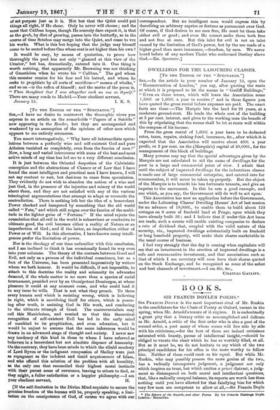70 THE EDITOR OF THE "SPECTATOR."] have no desire to
controvert the theosophic views you express in an article on the remarkable "Papers of a Suicide" now appearing in the Reader, but they are accompanied and weakened by an assumption of the opinions of other men which appears to me entirely erroneous.
You assert interrogatively, "Why have all intermediate specu- lations between a perfectly wise and self-existent God and pure Atheism vanished so completely, even from the fancies of men?" Now, a long and varied intercourse with some of the best and most active minds of my time has led me to a very different conclusion.
It is just between the Oriental despotism of the Calvinistic conception and the abstractions of Chance or of Law that I have found the most intelligent and practical men I have known, Twill not say content to rest, but desirous to cease from speculation. They evidently do not wish to abandon the notion of a wise and just God, in the presence of the injustice and misery of the world about them, and they are not satisfied with any of the various teleological argumentations that attempt to adapt or reconcile the contradiction. There is nothing left but the idea of a benevolent Power checked and hampered by something that the old world called "Fate," and which still reigns over the fancies of the multi- tude in the lighter guise of "Fortune." If the mind rejects the consolation that all evil in the world is subservient or conducive to ultimate good, the evil becomes either a reality of Nature or an imperfection of God ; and if the latter, an imperfection either of Power or of Will. In this alternative, I have known many intelli- gences prefer the limitation of power.
Nor is the theology of our time unfamiliar with this conclusion, and I am inclined to think it has occasionally found its way even into your columns. The theory of the contests between Good and Evil, not only as a process of the individual conscience, but as a fact of the Universe, has been presented impressively by writers whom we both honour. It would be difficult, if not impossible, to attach to this doctrine the reality and solemnity its advocates demand, if the whole matter is no more than a species of social tournament, presided over by an Omnipotent Demiurgos, at whose pleasure it could at any moment cease, and who could lead it to any issue he wills. That is not what they preach. To them every human soul which is resisting wrong, which is believing in right, which is sacrificing itself for others, which is yearn- ing after truth, is assisting God in His work, and conducing to the ultimate triumph of Good. The controversialists may call this Manicheisua, and remind us that this theoretical recognition of self-existent Evil has led in the early mind of mankind to its propitiation, and even adoration, but it would be unjust to assume that the same inferences would be drawn in an advanced stage of thought and society. I never saw any tendency of tbis kind in those to whom I have referred as believers in a benevolent but not absolute disposer of humanity. On the contrary, they have been minds to which the ribald mockery of Lord Byron or the indignant compassion of Shelley were just as repugnant as the indolent and timid acquiescence of Islam, and who offered this solution of the problem with all humility, as the only one that reconciled their highest moral instincts with their purest sense of reverence, leaving to others to find, as they might, a fuller satisfaction or a happier philosophy.—I am [If the self-limitation in the Divine Mind requisite to secure the genuine freedom of the human will be, properly speaking, a limi- tation on the omnipotence of God, of course we agree with our correspondent. But no intelligent man would express this by describing an arbitrary caprice or fortune as paramount over God. Of course, if God desires to see men free, He must let them take either evil or good ; and even He cannot make them both free and not free at once. But this inlet for evil is not an inlet caused by the limitation of God's power, but by the use made of a higher good than mere innocence, —freedom, by men. We never heard before of any modern Theist who enthroned Destiny above God.—Er. Spectator.]






























 Previous page
Previous page